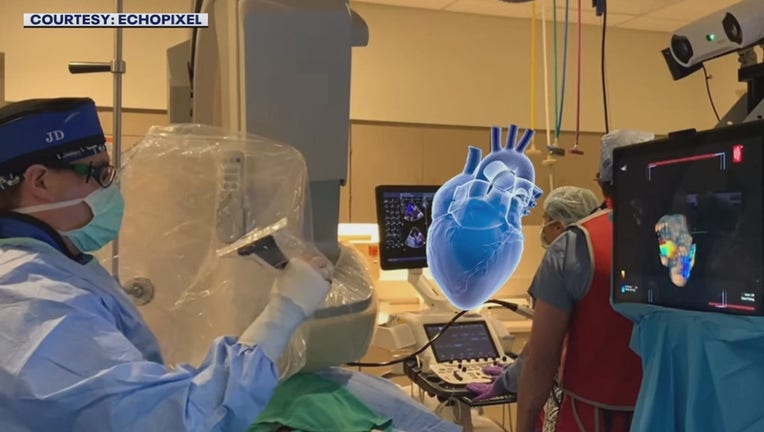St. Cloud Hospital first to use 4D hologram technology during heart procedure

By wearing special glasses, the doctor can see the hologram of the heart during the procedure through EchoPixel 4D technology. This is a graphic illustration depicting what the doctor would see.
ST. CLOUD, Minn. (FOX 9) - CentraCare Hospital in St. Cloud is the first in the world to use 4D technology during a heart procedure, allowing the cardiologist to see in and around the heart using a hologram.
The cutting edge innovation is being used on patients with structural heart issues, like atrial fibrillation. FOX 9 went into the operating room on Thursday to watch the sixth procedure done using EchoPixel technology.

St. Cloud Hospital first to use 4D hologram technology during heart procedure
CentraCare Hospital in St. Cloud is the first in the world to use 4D technology during a heart procedure, allowing the cardiologist to see in and around the heart using a hologram.
"Thought I was in Star Wars, this is space age stuff," said Dr. Jake Dutcher, a CentraCare cardiologist. "To see something with that amount of clarity and to see something actually floating just kind of blew me away. It’s cool, it’s very cool."
The patient has atrial fibrillation and is getting a device called the WATCHMAN. It closes off part of the heart to prevent a blood clot from forming. It’s a crucial procedure because a clot could lead to stroke. However, now the procedure is being done with even more precision than ever before using both EchoPixel 3D and now 4D technology.
"It’s a software that allows physicians to use standard medical images like ultrasound or CT to see the patient as a hologram that they can reach around and reach in and interact with," said Sergio Aguirre, the CEO of EchoPixel.
Glasses allow only the doctor to see the hologram. To the naked eye, it’s as though he’s just moving the stylus in space, but the doctor can see the patient’s heart, measure it, see its unique traits and anything that might impact the placement of the WATCHMAN.
"And to be able to see that in four dimensions and live and moving gives me as a physician more confidence that I’m satisfied with the location of that device and we’re going to get an ultimate positive outcome for the patient," said Dr. Dutcher.
Ready to go, the WATCHMAN device folds like an umbrella to be pushed through a catheter up to the heart. Dr. Dutcher uses the hologram to help place it.
"We now have a hologram that sits right above the patient and I can see the device and the catheter as we implant that into the appendage," said Dr. Dutcher.
This technology helps to reduce procedure time, allows for little or no contrast dye, which can be toxic to the kidneys, and there is less radiation involved. At CentraCare there are about 12 to 15 A-fib procedures a month.
Medical staff told FOX 9 the patient’s procedure was a success. While they patient will stay overnight, they will likely head home the next day.

